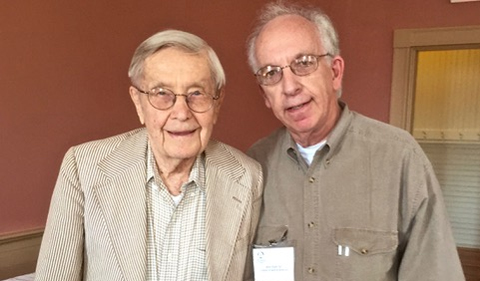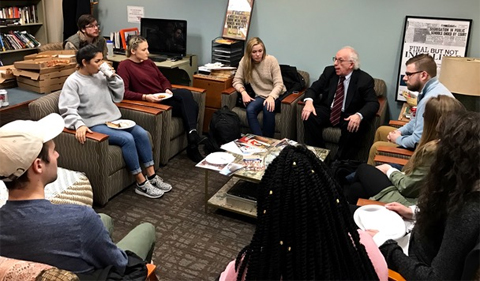
Editor’s Note: The College of Arts & Sciences Notable Alumni Awards honor alumni for broad career accomplishments, commitment to community service, and valuable contributions to Ohio University and the College of Arts & Sciences.
Alan Jay Rom ’67 Economics
By Regina Yoong
Alan Jay Rom is a lawyer focusing on employment law and civil rights, has taught at several law schools, and served in the Peace Corps.
“In 2011, Attorney Alan Jay Rom established his private practice, Rom Law P.C., focusing on employment law. He served as an Assistant Attorney General in the Civil Rights Division from 2008 to 2011. From 2007 to May 2008 he was the Litigation Director of Legal Assistance Corporation of Central Massachusetts, and from 2002 through 2006 was the Executive Director of the Massachusetts Appleseed Center for Law and Justice Inc., in Boston, according to his law firm site.
“Prior to joining Massachusetts Appleseed in August 2002, he concentrated on employment law matters, including the Fair Labor Standards Act, its Massachusetts equivalent, and employment discrimination at the Law Office of Sherwin L. Kantrovitz, PC, for seven years. From 1977 to 1995 he was staff counsel to the Lawyers’ Committee for Civil Rights Under Law of the Boston Bar Association, where he focused on employment discrimination, voting rights, and education law. From 1972 to 1977 he represented migrant farm workers in two legal services programs.
Rom taught at Northeastern University School of Law and Tufts University and has authored several law-related articles and lectured at various law schools. “He served as an economic advisor for a rural savings and loan cooperative in Bolivia while in the Peace Corps from 1969-1971. He is a member of the Massachusetts, Connecticut, New Jersey and Ohio Bars and is admitted to the Bars of the Supreme Court, First and Second Courts of Appeal, and the United States District Courts for the Districts of Massachusetts, Connecticut and New Jersey,” says his law firm bio.
Rom earned a B.A. in Economics from the College of Arts & Sciences at Ohio University. In 1972, he graduated from Cleveland State University School of Law.
OHIO Memories
During his time at OHIO, Rom recalls a distinct and fond memory of reading Shakespeare at OHIO and captures the way his experience at OHIO shaped a critical point in his career.
“I remembered the classroom where I took the Shakespeare tragedies from the best professor I ever had in my life, Dr. Paul Murray Kendall at Bentley Hall, Room 140. It is on the first floor and is an auditorium style classroom, with two aisles separating three sections. When I took the course, either in the Fall of 1965 or Spring of 1966, the building had undergone recent renovations. There were no windows in the classroom. We were studying ‘Othello,’ and this is just as Sir Laurence Olivier’s ‘Othello’ had come out in color film,” he recalls.
“Dr. Kendall had us write in the book for all of the plays. He had us transfixed to being in Venice and he paced back and forth in the classroom and walked up and down the two aisles while he recited the roles of each—but without the book (he had it down to the commas!). As we got to the climax, where Othello is about to kill Desdemona, in Act V, Scene II, there is a line, ‘Put out the light, and then put out the light.’ As a split-second reaction to that line, there was a blackout in the building and everything went pitch-black. Needless to say, it broke everyone’s intense concentration, including Dr. Kendall’s. He tried to continue, lighting two or three matches, before he said, ‘This is the climax of my career, class dismissed.’”
Shakespeare and a Career in Law
From 1982 to 2005, he served as co-counsel for the plaintiffs in the Massachusetts school finance litigation for 23 years. During that period, they won the case at the liability issue in 1993, then the legislature passed a new law in response and they went back to court to say it was not enough to remedy the problem of students in property-poor districts having access to a constitutionally adequate education under the Massachusetts Constitution. Rom and his co-counsel had a 78-day trial before a specially appointed Superior Court judge between June 2003 and January 2004, where they had over 1,100 exhibits and 114 witnesses.
The judge made findings of fact all in our favor in some 350 pages, and they found themselves back at the Supreme Judicial Court, where the case originated. The Court, while agreeing with all of the findings of fact, denied relief, and the real reason was money. To remedy all of the problems found by the court would have resulted in not merely new taxes, but a new tax structure, and the Court is dependent on the legislature for funds for its operation, and it wasn’t going to risk that. So, it said that it was denying relief because the Department of Education had “a plan.”
Rom recalls that he was angered by the cover-up. He knew that if he said something, he would endanger his career, so he decided to write about it. Before he wrote, he remembered his Shakespeare class. It was “Othello” revisited. “I knew my theme was we kill the things we profess to love, and I knew I would end the article with the quote from Act V, Scene II. I knew that, because that class came back to me in a nanosecond.”
In 2017, Rom returned to OHIO to give a lecture titled, “I Never Left OU.” Rom adds, “It was a great choice on my part to attend Ohio University, and I hope that Ohio University doesn’t regret approving my application.”






















Comments